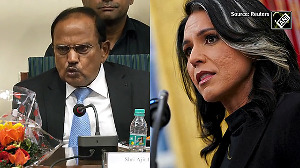With Manmohan Singh taking over at the helm, a predictable chorus has erupted that this is a signal that the Congress intends to continue with the 'reforms' advocated by the outgoing Vajpayee government. This view is expressed with a sigh of relief usually, as if to suggest that there should be no fear of resurgent Left parties restraining the economic direction of the country too much. We have invested too much in the direction set by Vajpayee (and before that by Singh himself), this argument goes, and it is important that an economic course for which all parties have shown support shouldn't be altered. The reforms, we are told repeatedly and insistently, must continue.
Nothing could be further from the truth. If anything is to be read to the verdict of Elections 2004, it is precisely the opposite. Whatever label political parties may have attached to the dominant economic trend of the last decade -- liberalisation, globalisation, reforms, etc -- the voters have consistently given it the thumbs down. There is not a single political event in India since the IMF-enforced changes in policy that the people have rewarded unequivocally at the ballot box. If there is one thing that the current prime minister can be said to have in common with the outgoing government, it is this: in each case, their five-year stewardship of much-touted acceleration in the nation's economic prospects ended with a sudden brake applied by the people.
Whenever the people have had the opportunity to comment (electorally, that is) on the agenda brought before them, they have provided the same answer. No to the mindless destruction of national assets in the name of efficiency. No to the prioritisation that puts the wealth of a few before the livelihood of millions. No to distorted spending by the states and the Centre that has connected a small minority to the information economy and abandoned everyone else to Middle Age standards of health and income.
But of course, the problem is -- and has been for some years now -- that nobody really asked the people. Elections have become minor concessions to the Constitution, and their results do not actually separate one set of choices from another. This election struck a new low, even for parties that are exceptionally good at non-choices. One leader who didn't want to be the leader, but wouldn't say until the very last moment who she would handpick instead. And another leader who plainly wouldn't have lasted five years, but was also not going to say who might be riding on his coattails.
Everything has been globalised except our consent, George Monbiot points out in his provocative book The Age of Consent. Monbiot, a regular with The Guardian of the UK, argues that the economic and social order which now dictates so much of our existence has been completely monopolised by financial interests and their political henchmen everywhere. These profiteers, however, have carefully preserved a veneer of democracy around their agenda to give themselves the appearance of legitimacy. Indian elections were simply the latest cheerleading stop along this charade.
The irony is that in faraway Britain, Monbiot 'interpreted' the results in Andhra Pradesh as a public revolt against the economic agenda of the outgoing Naidu government, but in Andhra itself the incoming replacement was eager to reassure the world that it would continue precisely those policies, but adding a 'human touch.'
These convenient interpretations of the results are just that -- convenient, but nowhere near the truth. People don't want a 'human face' on these reforms -- it is noteworthy that no one ever bothers to say what s/he means by this, except in very vague and general terms -- and they certainly don't want current policies and processes to be tweaked to penetrate even deeper into the rural areas or among the urban poor.
Voters want this whole agenda cancelled, and they want genuine reforms to begin. They want governments to address the real concerns of the poor -- lack of access to credit, inadequate state support for basic needs, mounting unemployment, and continuing social shackles. And they want this to be done in a direct way, not as the indirect by-product in some shoddy economic theory from which even the little they now have appears to trickle away.
If 7 percent economic growth isn't enough to produce trickle-down effects fast enough to satisfy the voters, how much faster do you think the economy -- any economy -- can grow, if this is the route to prosperity we are set on? We must abandon the pursuit of indirect effects, ie, don't wait for investment in urban communities to drive limited local prosperity and thereafter lift social and economic standards more broadly. Instead, invest in the social objectives directly. Build schools, health centres, hospitals, and such in rural areas, and fund their staff.
The huge hit on the stock market is revealing; it shows as nothing else can to the investing classes how much of the economic 'growth' they take pride in is really a redistribution of wealth to the privileged. If 'reforms' are irreversible and necessary, why -- despite assurance of their continuation -- is there such panic? Dr Singh, if he plans to avoid a second drubbing of his economic policies in five years, would do well to sit down and ask himself: what have the people really said in this election?
Many of the pressing questions before the outgoing administration will remain before this one too. Is interlinking rivers finally, and mercifully, dead? Are WTO and domestic reforms in agriculture a priority? Is development funding going to further shrink as money is poured into building yet more weaponry that can never be used? Who are you going to hit with the 23rd nuclear weapon anyway?
Without real reforms, five years from now (if not sooner) the Congress will simply be at the receiving end of the same misinterpretations it now makes. Any attempt to put a human face on reforms that are nothing of that sort is more likely to result in another round of egg on its face. Honest reform must address the policies that lend themselves to change --embracing transparency in the use of public funds, investing meaningful oversight authority in regulatory agencies charged with protecting the environment, agriculture, and the nation's trading interests, setting benchmarks for State investments to lift socio-economic indicators, and accountability for failures. To blame failed outcomes on faulty implementation alone is to deliberately ignore that the people are dismayed by the policies themselves.
A last word for those who gained even more from these elections than the Congress, namely the Left parties. Their preference to stay outside the government and simply offer their support is abdication, plain and simple. In any election, people do not cast their ballot to only make sure that chosen leaders represent their interests. They also vote with the belief that those chosen by the process would be most accountable to them for representing those interests. A political party without any intention of joining a government it supports has no business running for office in the first place. Any genuine advocacy of its policies must include an earnest effort by the Left to administer them as well, not simply give itself the option to vote other people's choices up or down. That kind of irresponsibility is already well managed by the Congress and the BJP, and needs no further allies.






 © 2025
© 2025